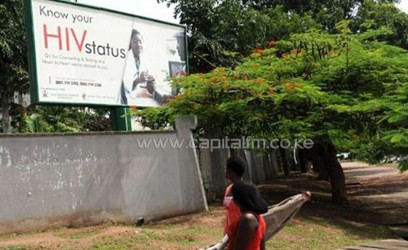
Although Kenya has made tremendous progress in the fight against HIV, the biggest impediment that continues to frustrate these efforts is the unwillingness and ignorance to undergo a HIV test/FILE
Under the theme of ‘getting to zero’ Kenya will be focusing on zero new infections, zero discrimination and zero HIV/AIDs related deaths.
“By zero numbers we mean HIV infections can be stopped. We ensure the virus is not transmitted to a HIV negative person. But the only way to do this is if people know their HIV status,” Kahindo explained during an interview with Capital FM News.
“Can we have all Kenyans knowing their HIV status so that those who will test positive and require treatment can start early? We need to know how many are positive so that we can ensure their immunity is sustained,” he appealed.
Although Kenya has made tremendous progress in the fight against HIV, the biggest impediment that continues to frustrate these efforts is the unwillingness and ignorance to undergo a HIV test.
According to Kahindo, only 40 percent of Kenyans know their status.
“Every year we screen about 6 million people, out of these people, 60 percent of them are coming for a retest, only 40 percent are coming for the first time. We are seeing the same people trying to confirm their status but not increasing the number of people who want to know their status,” he said.
“Six out of 10 Kenyans cannot tell you their status.”
He insisted that with people knowing their status Kenya can embark on interventions that can prevent, re-infections and new infections and at the same time provide early treatment for those already infected.
The main intervention is to ensure that people engage in safe sexual practices.
Other measures include prevention of transmitting the virus from a mother to child during pregnancy, birth and breastfeeding.
“We have a group of people between 12 and 18 years who are HIV positive but had never engaged in sex, where did they get it from? It was acquired from their mothers when they were born. Some are living innocently knowing they are negative. They start their sexual lives when they don’t know their status,” he regretted.
Kahindo further advised people to engage in protected sex by using condoms or abstain from sex.
“If someone is HIV positive they have to realise that is their status and they need to contribute to the fight against HIV to ensure they do not transmit it to somebody else,” he advised.
According to Kahindo, those who test positive require to be put on early anti-retroviral treatment to boost their immunity levels, protect them from opportunistic infections and also reduce chances of transmitting the disease should they engage in unprotected sex.
He expressed concerns that key populations such as commercial sex workers and same sex partners have a high HIV prevalence and also an increasing number of new infections.
In marking the day, the Public Health and Sanitation Ministry plans a grand event at the Afraha Stadium in Nakuru.
Dr Kahindo said that HIV testing will also be free in all government health centres across the country with an aim of encouraging Kenyans to know their status.














































